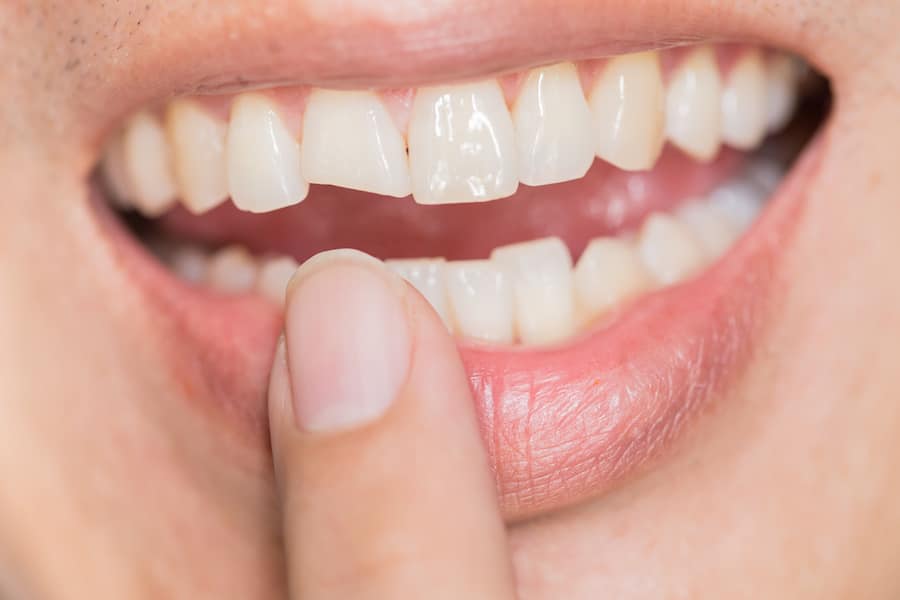There are many things in your life that you become so familiar with seeing, hearing or touching on a regular basis that you don’t particularly notice them until they change. As an example, you don’t necessarily consider how your tongue, lips and inner cheeks are constantly touching the smooth surfaces of your teeth, or how the surfaces of your teeth feel. At least not until something goes wrong.
It is often the strange feeling of a damaged or chipped tooth that alerts us to the fact that something is wrong in our mouth. That sinking feeling that accompanies this realization is perfectly normal. After all, we rely upon our teeth for eating, smiling and speaking, and need them to remain healthy and strong in order to perform their job well. And while the protective layer of tooth enamel is stronger than bone, it can still be worn or chipped away as a result of poor oral care, decay and damage, at which point it requires repair.
What Causes Teeth to Chip
Regardless of how small or large a tooth chip is, it cannot be left unresolved since it renders the tooth vulnerable to infection and decay. This is largely due to the fact that the main portion of a tooth that will chip off is the protective enamel. Obviously, tooth enamel that has been weakened due to decay, acid reflux, excessive alcohol consumption, bulimia and other similar conditions is more likely to chip more easily. Some of the most common causes of tooth chipping include:
- Poor nutrition habits that result in nutrient-deficient and therefore weakened teeth
- Falling on a hard surface so the tooth is impacted
- Biting something that is too hard
- Tongue piercings that constantly hit the tooth
- Sports injuries that include head impact
- Using teeth as tools, like bottle openers or scissors
Repair of Chipped Teeth
If you have a chipped tooth, it is imperative that you contact your dentist immediately in order to have it assessed and repaired. This is even true if you feel that the chip is minor, or painless. However, since there is a chance that you may have to wait at least a short while before seeing your dentist, you can help to keep your chipped tooth as comfortable as possible by:
- Rinsing your mouth gently with warm water
- Eating soft foods and chewing with your other teeth
- Avoiding spicy or salty foods that can irritate the chipped tooth
- Flossing after eating to remove food particles
- Using an ice pack over the gums to help numb the area and reduce discomfort or pain
- Covering sharp edges with dental wax, a tea bag or even sugar-free gum
- Taking an over-the-counter pain reliever if the discomfort or pain is extensive
When you arrive at your dentist’s office, she will take a look at the damage and determine what type of repair best suits your needs. Following are the most common chipped tooth repair options:
- Composite bonding. Minor chips or cracks that are mainly cosmetic can often be quite successfully repaired with composite bonding. This is much like the procedure used to repair teeth that have been damaged by decay, and consists of placing a tooth-colored resin over the chipped or cracked area. The resin is molded into the shape necessary to restore the tooth to its normal shape, and then hardened with a special curing light.
- Veneers. When front teeth suffer minor chips or cracks and are therefore primarily cosmetically damaged, a veneer can be an appropriate option. This thin porcelain or resin shell is created in the dental lab to fit perfectly over the natural tooth, improving its shape and appearance. They create a very natural look when placed over the teeth, and can last for several decades if well cared for.
- Crowns. In cases where the chipped or cracked tooth is substantially damaged or in pain, a crown may be necessary. The crown not only covers the entire natural tooth in order to strengthen it and better protect it against infection or damage, it also improves the appearance of a damaged tooth. Crowns are custom made in a dental lab based upon an impression taken by your dentist, and can be made to look like a natural tooth.
- Root canal. Where a chipped or cracked tooth is so severe that the center of the tooth is exposed, a root canal is necessary in order to prevent harmful oral bacteria from entering and infecting the tooth pulp. In this procedure, any dead pulp tissue and bacteria is removed, and the tooth is cleaned and sealed. A crown can be placed on top to improve strength, function and appearance.
Your dentist will prefer to repair your chipped tooth with the least invasive method possible, as long as that method will properly restore your oral health and function. It is rare that a chipped tooth requires a root canal or extraction, but if this is necessary in order to protect and restore oral health and function it will be recommended.
For more information about chipped teeth and your repair options, contact Avenue Dental Arts today.


